- Home
- Dornford Yates
Gale Warning Page 5
Gale Warning Read online
Page 5
Then all three spoke very warmly of what I had done. But I had had my reward. My task-mistress had actually taken my part.
“And now,” said Mansel, “to business.
“Thanks entirely to Bagot, we’re over the first big fence: it doesn’t look so bad now, but it was a hell of a leap. Bagot has gained in one night what might very well have taken us months to obtain.
“You see, all I knew was this – that of the five firms in that house, only two were firms which we could count out. One was Howson and Dewlap, and the other was a firm of solicitors on the first floor. To one of the others, then, I knew that our man belonged. But think of the task that presented… And think of the time we’d have wasted – on two firms out of the three…
“Well, we have been spared that nightmare. Bagot now knows by sight Barabbas’ chargé d’affaires, and I can give you the name of the firm to which he belongs. Benning and Sheba, General Agents, London and Valparaiso. That, of course, is a blind, though they certainly have an office in Valparaiso: and if you went to them and asked them to ship a car, they’d probably do it all right – through somebody else. Very well. He is Benning and Sheba, of 22 Sermon Square.
“Now, what do we want from him? We want Barabbas’ address.
“Well, it won’t be in his office – I think you may lay to that. And I think it more than likely that when he addressed those cuttings, he didn’t address them direct: he probably sent them to Paris, from where they will be sent on. And whenever Barabbas writes, he probably does the same. I mean, I know I should. Postmarks aren’t always blurred.
“That means we can wash out the post – we shall get nothing there. And men like Barabbas don’t talk on the telephone. But, happily for us, we are dealing with business men: and big business cannot be written – it simply has to be talked. You can correspond all right for weeks at a time, but sooner or later you’ve simply got to meet, if business is to be done.
“Now it is my firm belief that Barabbas comes to England as seldom as ever he can. Movement attracts attention: and once a fence has attracted attention to himself, he may as well shut up shop. So I think that, like all good fences, Barabbas sits still. I think he came to England after the Blanche Mains show. But that would have stung a limpet into a dance. As a general rule, I believe Barabbas stays put. Very well. If Barabbas stays put in France, how does he manage to talk to his chargé d’affaires? The answer, of course, is obvious. His chargé d’affaires goes to see him, now and again.
“Sooner or later, then, the man Bagot saw tonight will leave England for France – to have a talk with Barabbas, wherever he happens to be. And that will be our chance. I’ve no idea when he will go or what route he will take. But, when he goes, we must go with him, for he will lead us up to the fountain-head.
“Now, when people are going on a journey, they usually start from their homes: or, to put it no higher than this, it is at their homes, and not at their offices, that their visible preparations for a journey are usually made. The first thing, therefore, to do, is to find out where Bagot’s man lives.”
He paused there, and Lady Audrey opened her mouth.
“An office-boy,” she said, “can talk to a caretaker. It’s a hundred to one the caretakers live in the basement of 22 Sermon Square. They have the keys of the rooms and they keep them clean. And they know quite a lot of their patrons – a good deal more, perhaps, than their patrons think.”
“That’s perfectly true,” said Chandos. “But if you know that, Audrey, why, so does the fellow that Bagot was watching tonight. And it’s Sermon Square to a soak-pit that he has got those caretakers where they belong. All done by kindness, of course. Toys for the children at Christmas, and that sort of thing. And if Bagot approaches them, before we know where we are the fat’ll be burnt.”
“William’s right,” said Mansel. “I’m sorry, Audrey: but we’ve got to go round the long way.”
“By which you mean…?”
“That Bagot must point out this fellow to somebody else – someone who knows how to follow a highly suspicious man. Neither William nor I can do that, because we are known: neither Carson nor Bell can do that, because, as our servants, they have been seen with us: but, as luck will have it, I’ve got someone just as good. He is to be Bagot’s servant, if Bagot will take him on. But that’s for later, of course: he mustn’t be seen with him yet. His name is Rowley, and he used to be in the service of a very great friend of us both.
“All City men, even office-boys, go out to lunch: and Bagot, of course, will conform to that excellent rule. So, it is to be hoped, will Bagot’s man. Either going or coming, therefore, the two are certain to meet before very long. And when they do, Bagot will put his right hand – not into his trouser-pocket, but into the pocket of his jacket, as if he were feeling for something which he had lost. Rowley will see the gesture, and Rowley will do the rest.”
“How will Rowley know me?” said I.
“He knows you already,” said Mansel. “He was on the platform tonight. But I don’t want you to know him, till we’re over this fence. Oh, and by the way, I shouldn’t lunch at the club. After six it doesn’t matter so much, for people begin to clear out about half-past five. But when I arranged your election, I did not count on your being an office-boy.”
“Inconsistency rampant,” said Chandos.
“D’you think it’s safe for him to be seen going in?”
“For the moment, yes,” said Mansel. “He looks like a member, and not like an office-boy: and few, outside Howson and Dewlap’s, will know he’s an office-boy. There is a very slight risk: but I think we’ve got to take it, because, as a line of communication, the club is ideal.”
Lady Audrey lifted her voice.
“Suppose all goes as we hope. Mr Bagot shows him to Rowley, and Rowley follows him home – and Rowley then finds out that the fellow is leaving for France on the following day.”
“We must leave that night,” said Mansel, “and pick him up on arrival – ‘somewhere in France.’ I promise you, Audrey, so far as mere man can do it, we shall leave nothing to chance. Bell will cross the Channel on Monday, to fix up some sort of base on the other side. He gets on well with the French and he’s very, very good at that sort of thing. He ought to have everything ready in six days’ time: and then he’ll sit down and wait: he’s not coming back. So that, though we may have to leave at a moment’s notice, at least we can always be sure of a flying start.”
Lady Audrey regarded him straitly.
“I believe you have reason to think that when Mr Bagot’s man goes, he will go by road.”
“I have this reason to think so – that that is what I should do. You see, from his point of view, it is absolutely vital that he should not do that very thing which we hope so much that he will – lead some unauthorized person up to his master’s lair. Not that he loves Barabbas: but if Barabbas goes down, his occupation is gone.
“Now, if a man travels by train, or even by air, he cannot choose his company, and however much he mistrusts it, once he is moving, he’s got to stay where he is. But what is very much worse, from a criminal’s point of view, he has to use stations or ports, as the case may be: and, quite apart from the fact that stations and ports are beloved by plain-clothes men, the movement in those places is such that, however skilful he is, he can never be sure that he isn’t being watched by somebody there. But if a man goes by road in his private car, he can make sure that he isn’t being followed or watched. I mean, I think that’s clear. Half a dozen times in the day, he can, if he pleases, confirm that desirable fact. And if he’s not sure, he can stop or turn or go back. Better still, he can lie up by day and travel by night, when the lights of a following car would instantly give it away.”
Lady Audrey drew in her breath.
“If you’re right, and he goes by road and travels by night…”
“Quite so,” said Mansel. “It’s going to be very hard. But remember we’re four to one, and that’s going to be a great help.”
I saw the stars leap into my lady’s eyes.
“My God, d’you mean that, Jonah? You’ll really let me come in?”
Mansel smiled.
“Up to the neck, my dear – if you’ll swear to do as I say. I’m bound to warn you, you may have a pretty rough time. I don’t say you will, but you may. No bath and no bed for two days, or possibly three, It all depends on where Barabbas hangs out. And if you fall by the way, we must let you lie.”
“Don’t worry,” said Lady Audrey. “I shan’t do that. And what do I care if it’s rough? I’d sleep in my clothes for a month, if that would help us to get that butcher down.”
“We know you would,” said Mansel, “and that’s why we want you in. For your sake only, I’d rather that you were a man.” He turned to me. “Audrey,” he said, “is one of those very few women who have a way with a car. I can almost believe that she could drive in her sleep. And her sense of direction is the finest I ever saw.”
“And as those two gifts,” said Chandos, “are precisely what is required – I’m assuming, of course, that our man will travel by road – not to use them would be suicidal: you can’t get away from that.”
My lady inclined her head.
“Thank you both,” she said gravely. “I promise I won’t let you down. She turned to me. You mustn’t believe all you hear. On my day out I’m not too bad on the road, but Richard is better than I am, and Jonah can drive a car backwards smoother and faster than most men can drive one in first.”
“Which is absurd,” said Mansel. “And now I’m going to be brutal, pull the rip-cord and bring our balloon down to earth. ‘I’m assuming,’ said William just now. So are we all: and it’s done us a power of good. Agreeable speculation is just like a Turkish bath. But now we must take our cold plunge – and go back to Sermon Square.
“I hope that before very long the scene will shift, and, as I told you just now, I shall do my best to ensure that, when it does, we can walk straight on in the next. But it may not shift for some time. Bagot may come and go, yet not set eyes on his man; and though there’s always the church, Benning and Sheba’s late sittings are probably very rare. It’s no good not facing these things…
“Bagot will start work on Monday – and concentrate all he knows upon keeping his job. He will also avoid Tulip Lane and the leads of the church of St Ives. Once is enough, when enough’s been as good as a feast. At lunch-time he’ll keep his eyes open – no more than that. Be ready, of course: but on no account look for your man. And don’t try and pick out Rowley: his eye’s not dim.”
He stopped, to glance at his watch.
“Time to burn,” he said. “But Audrey gets out at Swindon and Bagot at Stroud. Most inconvenient, of course: but that is the worst of being without the law. And no one need be afraid of going to sleep. Carson is on duty as call-boy, and he won’t fail.”
With that, he closed his eyes, and after a little Chandos began to doze. But I was too much excited to take any rest, so I sat back and waited till Lady Audrey should speak.
For a while she stared out of the window on to the flying country she could not see. Then with a sigh she looked round, to glance at Mansel and Chandos and then at me.
“You must be tired,” she said.
I shook my head.
“I haven’t done much today.”
“I don’t agree,” she said shortly. She settled herself in her corner and put up her elegant feet. “And I shouldn’t have called you a remount. I might have known that George wouldn’t make a mistake.”
“It was true enough,” said I.
“Well, it isn’t now. You’ve – ‘passed out.’ In future I’ll call you ‘John.’ And if you can manage ‘Audrey’ – well, that’s my name.”
“If you please,” said I, and felt more than pleased myself.
“Tell me honestly – how do you feel about things? Shall we ever discover Barabbas?” Before I could answer, she lifted a little hand. “Don’t say ‘Of course we shall,’ for we’re past that stage. Pretend you’re a looker-on, and then say what you think.”
“I think,” said I, “it’s only a question of time.”
“We’re red-hot now because we’re straight from the fire. But after a while, you know, an iron grows cold.”
“This one won’t,” said I, and meant what I said. “Barabbas will go to Hell – no doubt about that. But I want to take his ticket and see him off. George was damned good to me.”
To that she made no reply, and when I looked up, she was staring out of the window, with one of her hands to her mouth.
“I’m sorry,” I said. “I’m afraid I speak as I feel.”
Her head was round in a flash.
“Try not to be a damned fool.”
I swallowed.
“To tell you the truth,” I said, “I’m not very good at women.”
“Dear God,” says she, “and when did you find that out?”
“Two nights ago,” said I, “when I spoke on the telephone.”
There was a little silence.
Then—
“You say,” she said, “that you think it’s a question of time. But in your heart you know it’s a question of luck.”
“Not altogether,” said I. “Let me put it like this. We are going to go to all lengths to get what we want: we are going to spare no labour and no expense: we are going to take every precaution that man can take. Well, people who do these things are very well placed for dealing with what is called luck. If it’s good, they can pounce upon it and suck it dry: if it’s bad, they can cope with it better than people less well prepared.”
“Very specious, John; but, supposing we get so far, we shall need the devil’s own luck to keep in touch with your gentleman’s car in France.”
“I don’t know the country,” said I. “But I’ve always understood that it’s much more open than England.”
“It is,” said Audrey. “And the traffic is very slight. But if there’s plenty of room, there are plenty of roads, and if I didn’t want to be followed, I guess that I’d have my way.”
“I can’t argue with you about that. But human nature should help.”
“What d’you mean by that?” said Audrey.
“He’ll put us through it to start with – no doubt about that. Twist and turn and double, in case he is being trailed. And then, being human, he’ll make up his mind that he’s safe and stick to the path. Precautions pall very fast, when, for all you know, they may be a waste of time.”
“You’re begging the question,” said Audrey. “If ever a man of that type makes up his mind that he’s safe, you may bet he is safe. Never mind. Are you as good at French as you are at women?”
“Just about,” said I. “I can’t speak a blasted word.”
“Dear God,” says she, “that’s a help.”
“I depend upon you,” said I, “to talk and to drive.”
She stared upon me open-mouthed.
“Thanks very much,” said she. “And what will you do?”
“I shall keep you straight,” said I. “If I can do that, I believe we ought to get home.”
Audrey glanced round the carriage, as though for support. But Chandos’ lips were pursed and Mansel was smiling – apparently in his sleep. With a sudden movement, she pushed back her thick dark hair.
“All square,” she said. “And I thought I was good at men.”
“I should think you are,” said I. “Very good indeed.”
She shook her head.
“You’ve shown me, John, that I have a lot to learn. And now I’m going to do what I can to doze, and you’d better do the same. You’ve earned a better night than you’re going to get.”
With that, before I could answer, she shut her eyes – which was as good as saying that our conversation was closed. For this I was sorry – if for no other reason than because I had not yet ventured to accept her invitation to use her Christian name. Still, I comforted myself with the thought that, when she got out at Swindon
, to mumble “Good night, Audrey,” ought to be easy enough, and settling myself in my corner, began to review the events of the last few hours.
But Nature loses no chances…
In point of fact, I suppose I was very tired. Be that as it may, the next thing that I remember was Carson’s voice in my ear, announcing that in five minutes’ time we should run into Stroud. And there was Mansel smiling and Chandos cleaning a pipe, while Audrey’s corner was empty, as though she had never been there.
I shall always remember gratefully my time with Howson and Dewlap, short though it was. Everyone in that office was kindness itself. The work, of course, was nothing: it was the post. I made such a glorious cock-shy…yet nobody threw any sticks. The grave-faced Mr Bonner, the junior clerks, the busy typists, the cheerful switch-board girl – one end all were as sympathetic as people could be. Mr Banner gave me papers ‘which he thought I might like to read’: the clerks told me where to lunch and related the manners and customs which Howson and Dewlap kept; the typists brought me tea; and Miss Taylor, the switchboard girl, who did my duty when I went out to lunch, watched over me like the angel I think she was. With the partners, of course, I had little or nothing to do: and for this I was truly thankful, for Lacey had shown me great kindness in taking me on, and since, when I left his service, I might have to do so without any notice at all, I had no wish to enter more deeply into his debt. If sometimes my hours seemed long, my duties were very light, and since to sit and do nothing was more than I could endure, I made one or two innovations, for which my successors have probably cursed my soul. They are not worth setting down, but Mr Bonner approved them with all his might, and to my confusion my wages were raised that week – a kindness which hit me harder than any rebuke could have done. I like to think that the measure I gave was good; but sailing under false colours is not the sort of progress that one can ever enjoy, and when your consorts go out of their way to be nice, the burden they lay upon you is heavy to bear. At night I slunk to the club, where the deference shown me by the servants made me feel ill at ease; and when I went back to my rooms, to find my things in order and comfort ready and waiting for my return, I felt ashamed of the role I was playing in Sermon Square. However, there was nothing to be done. Till Fate or Mansel released me, the game must go on. With twelve thousand pounds behind me, I must continue to pose as a ‘down-and-out’ and, as such, to accept a goodwill which many an honest beggar has never known.

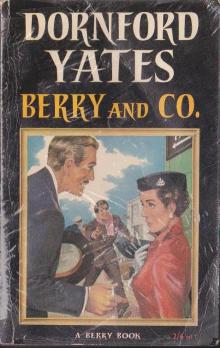 Berry and Co.
Berry and Co. Jonah and Co.
Jonah and Co. The Funny Bone: Short Stories and Amusing Anecdotes for a Dull Hour
The Funny Bone: Short Stories and Amusing Anecdotes for a Dull Hour The Brother of Daphne
The Brother of Daphne Courts of Idleness
Courts of Idleness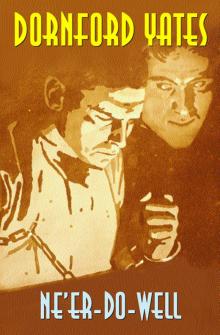 Ne'er Do Well
Ne'er Do Well She Painted Her Face
She Painted Her Face Safe Custody and Laughing Bacchante
Safe Custody and Laughing Bacchante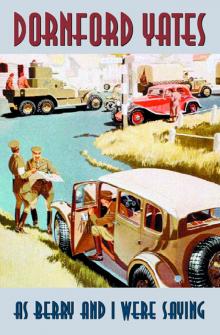 As Berry and I Were Saying
As Berry and I Were Saying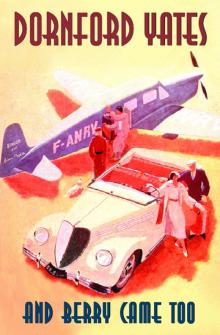 And Berry Came Too
And Berry Came Too Valerie French (1923)
Valerie French (1923) Brother of Daphne
Brother of Daphne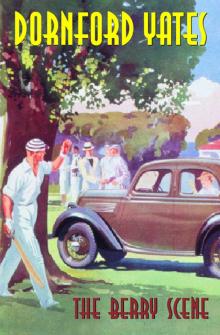 Berry Scene
Berry Scene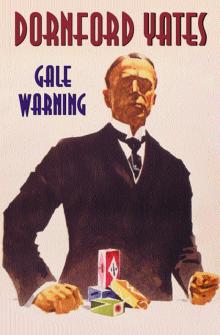 Gale Warning
Gale Warning B-Berry and I Look Back
B-Berry and I Look Back Storm Music (1934)
Storm Music (1934)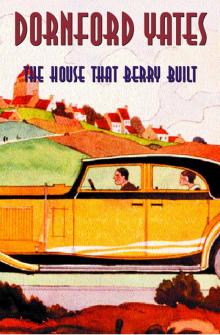 House That Berry Built
House That Berry Built